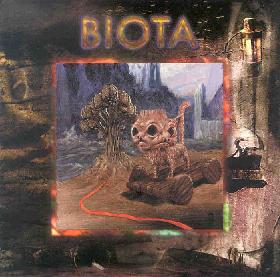From what I’ve gathered listening to an infinitely small sampling of all the music out there, all genres have their
highs and lows. Whether it’s a specific
moment or scene, or just a handful of artists and albums, every category (save
for an anomaly or two) offers both great and horrible music. However, for me personally, the range of
quality is never as extreme as with progressive rock. At its best prog is both complex and
evocative, offering varied and intricate instrumentation that can still stir up
abstract yet potent emotions. Conversely,
emotions and an artistic focus are often eschewed for technical wankery,
pseudo-intellectual concepts, and general soullessness. Whenever I hear an album described as 'progressive rock', I get both excited and nervous, as the potential for both
success and failure is massive.
Enter Biota. Originally conceived as the art collective
Mnemonists, Biota broke from this group to focus on making avant-prog with
colorings from practically any and every traditional folk influence out
there. The group specializes in dense,
heady pieces that swirl, bubble, and convulse rather than follow any
specific structure. Combining standard
rock instrumentation with French accordion, gamelan, Hindustani, jazz, and
other styles I’m too ignorant to know of, the result is almost psychedelic in
the most disorienting way imaginable. Sometimes
composed, often times improvised, Biota seem to speak a language of color,
moving from texture to texture with a keen attention to atmospheric
detail.
Based on my pretension towards prog,
I’ve just described either the most elaborate and creative band out there, or
absolute drivel that barely holds itself up as pure kitsch. On paper it’s impossible to tell which is the
truth, but a listen to Invisible Map
offers a case for the former. Tracks
like “The Rapid Color”, “Mineral”, and “Telegraph Plant” are exercises in
crafting esoteric soundscapes, creating an ephemeral feel. Meanwhile, more grounded tracks such as
“Landless” and “Birthday” apply their slanted musical sensibility to pop
structures and succeed masterfully. Overall,
each quick track works towards maintaining an intense yet breathtaking
atmosphere that is quite unlike any other music.
What makes Invisible Map, as well as other Biota releases such as Object Holder, succeed is that their
unique choice in structure and instrumentation never feels like a gimmick to
appear cerebral. Instead, this music
genuinely feels as if it reflects the group’s own quirkiness and crooked view
of reality. Invisible Map ultimately succeeds because it’s the product of weird
musicians placing concentrated self-expression above convoluted self-indulgence,
whereas other progressive rock outfits do the opposite.

i'm a member of Biota, but i'll speak for myself. this is one of the best reviews of our stuff i've ever seen
ReplyDelete